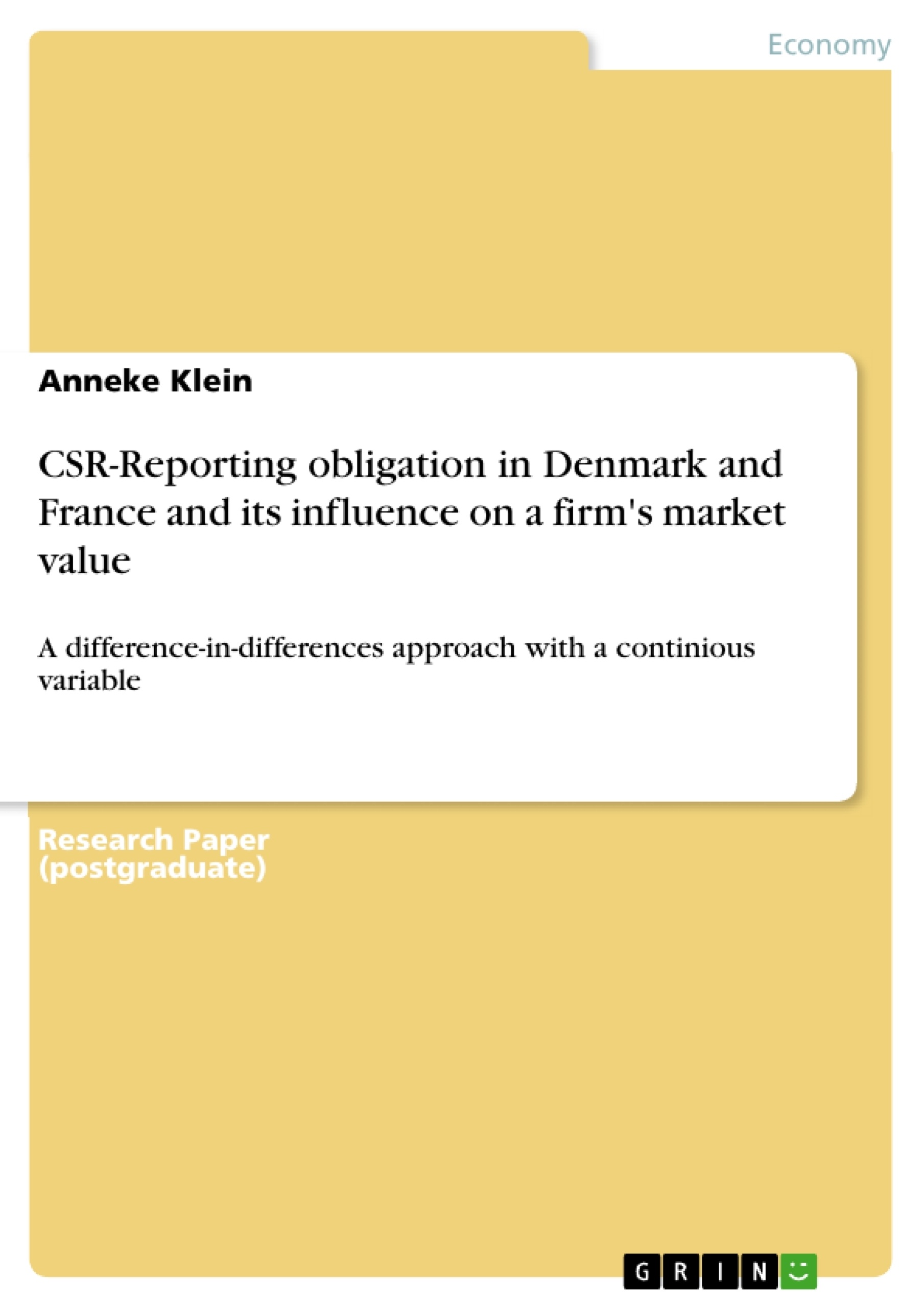This paper examines the influence of the ESG-Score on the market value. Unlike most researches, this one does not only concentrate on the effect of a single ESG-Score. Instead, it is a natural experience, analysing the impact of an exogenous event on a firm’s market value. More precisely, the influence of a law’s implementation to disclose sustainable belongings of a firm. The two countries that introduced aforementioned law were Denmark in 2009 and France in 2012. By using a Difference-in-Differences Approach, significant changes in market value for firm’s obligated to report within those countries are analysed and compared to other firms non obligated, listed in the STOXX Europe 600.
The estimates suggest a significant negative influence on the market value for firms obligated to report situated in the post-intervention. Further, the negative influence increases with a complementary increase in delta ESG-Score. Those results suggest that a company should not suddenly abdomen itself to sustainability from one year to another. It is advisable to gradually address the matter in order to not negatively influence the market value of the company.
Sustainable thinking is a movement of modern world society that can be noticed each passing day. When comparing the year of 2009 with the one of 2012, an increase in socially reasonable investment assets of 22 percent is noticeable. Besides, an ever-increasing number of people are joining environmental protest groups and pressure governments over the world to act. They want the government to, for example, force firms to produce more sustainable. Therefore, Corporate Social Responsibility (CSR) is becoming increasingly important in the daily business of a company. Many firms consequently responded by publishing a sustainability report each year and with that voluntarily report about environmental and social concerns of the company. Often, they disclosure such a report to legitimize their behaviour and actions. The government of Denmark reacted in 2009 and the one of France in 2012 to named protests with a law requiring companies meeting certain criteria to publish a report that contains non-financial information.
Inhaltsverzeichnis (Table of Contents)
- Abstract
- 1. Introduction
- 2. Literature Review
- 2.1 Theoretical Framework
- 2.2 Prior Research
- 3. Materials and Methods
- 3.1 Sample Selection
- 3.2 Research Methodology
- 4. Research and Discussion
- 4.1 Results
- 4.2 Discussion
- 4.3 Robustness analysis
- 5. Conclusion
- References
- 6. Appendix
Zielsetzung und Themenschwerpunkte (Objectives and Key Themes)
This research paper investigates the impact of mandatory CSR-reporting obligations on a firm's market value. By examining the experiences of Denmark and France, which implemented such regulations in 2009 and 2012 respectively, the study uses a Difference-in-Differences approach to analyze the effects on firms' market value both before and after the implementation of the laws. The paper seeks to determine if there is a statistically significant influence, whether positive or negative, on a firm's market value as a result of these reporting requirements.
- The influence of mandatory CSR-reporting on a firm's market value.
- The impact of an exogenous event (law implementation) on a firm's market value.
- The role of the ESG-Score in relation to CSR reporting obligations.
- The use of a Difference-in-Differences approach to analyze the impact of the reporting regulations.
- A comparison of firms obligated to report and those not obligated to report.
Zusammenfassung der Kapitel (Chapter Summaries)
- Abstract: This paper examines the impact of the ESG-Score on a firm's market value using a Difference-in-Differences approach, focusing on the implementation of CSR-reporting regulations in Denmark and France. The paper explores the potential influence of these regulations on firms' market values, with a particular emphasis on the relationship between the ESG-Score and the observed changes.
- Introduction: The paper introduces the growing importance of Corporate Social Responsibility (CSR) and the increasing pressure on firms to disclose their environmental and social impacts. It highlights the role of governments in implementing mandatory CSR-reporting regulations, specifically referencing the examples of Denmark and France. The paper's research question focuses on the potential influence of CSR-reporting obligations on a firm's market value.
- Literature Review: This section explores the theoretical framework of sustainable development, focusing on the legal and regulatory landscape regarding sustainable disclosures, particularly within the European Union. It also examines prior research related to the impact of CSR reporting on firm value, highlighting the importance of considering the specific context and factors that may influence the relationship between CSR and market performance.
- Materials and Methods: This chapter outlines the methodology used in the research, including the sample selection and the Difference-in-Differences approach used to analyze the impact of the CSR-reporting regulations. It provides details on the data sources and the statistical methods employed to measure the influence of the regulations on firm value.
Schlüsselwörter (Keywords)
The key terms and concepts in this research include CSR-reporting obligation, market value, ESG-Score, Difference-in-Differences approach, Denmark, France, sustainable development, and non-financial reporting. The research explores the influence of mandatory CSR-reporting requirements on firm value within the context of the evolving legal and regulatory landscape surrounding sustainable disclosures and the increasing importance of ESG factors in corporate decision-making.
- Quote paper
- Anneke Klein (Author), 2019, CSR-Reporting obligation in Denmark and France and its influence on a firm's market value, Munich, GRIN Verlag, https://www.hausarbeiten.de/document/502545



